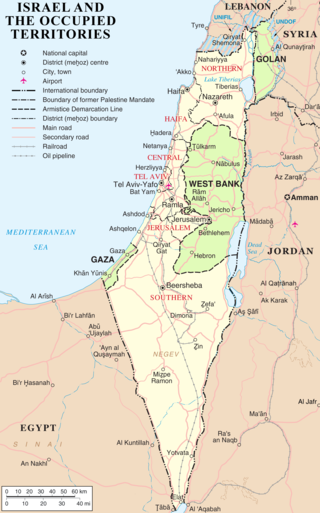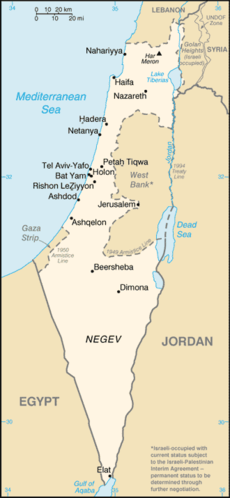
The First Intifada or First Palestinian Intifada, also known simply as the intifada or the intifadah, was a sustained series of protests and violent riots carried out by Palestinians in the Palestinian Territories and Israel. It was motivated by collective Palestinian frustration over Israel's military occupation of the West Bank and the Gaza Strip, as it approached a twenty-year mark, having begun after Israel's victory in the 1967 Arab–Israeli War. The uprising lasted from December 1987 until the Madrid Conference of 1991, though some date its conclusion to 1993, with the signing of the Oslo Accords.

United Nations Security Council Resolution 478, adopted on 20 August 1980, is one of two General Assembly resolutions followed by seven UNSC resolutions condemning Israel's attempted annexation of East Jerusalem. In particular, UNSC res 478 notes Israel's non-compliance with United Nations Security Council Resolution 476 and condemned Israel's 1980 Jerusalem Law which declared Jerusalem to be Israel's "complete and united" capital, as a violation of international law. The resolution states that the council will not recognize this law, and calls on member states to accept the decision of the council. This resolution also calls upon member states to withdraw their diplomatic missions from the city.

United Nations Security Council resolution 446, adopted on 22 March 1979, concerned the issue of Israeli settlements in the "Arab territories occupied by Israel since 1967, including Jerusalem". This refers to the Palestinian territories of the West Bank, East Jerusalem and the Gaza Strip as well as the Syrian Golan Heights.
The International law bearing on issues of Arab–Israeli conflict, which became a major arena of regional and international tension since the birth of Israel in 1948, resulting in several disputes between a number of Arab countries and Israel.

United Nations Security Council Resolution 452, adopted on 20 July 1979, addressed the issue of the Israeli settlements in Jerusalem, the West Bank, Gaza Strip and the Golan Heights, specifically the illegality thereof. It states that "the policy of Israel in establishing settlements in the occupied Arab territories has no legal validity and constitutes a violation of the [Fourth] Geneva Convention relative to the Protection of Civilian Persons in Time of War, of 12 August 1949" and "calls upon the Government and people of Israel to cease, on an urgent basis, the establishment, construction and planning of settlements in the Arab territories occupied since 1967, including Jerusalem."

Israeli-occupied territories are the lands that were captured and occupied by Israel during the Six-Day War of 1967. While the term is currently applied to the Palestinian territories and the Golan Heights, it has also been used to refer to areas that were formerly occupied by Israel, namely the Sinai Peninsula and southern Lebanon. Prior to Israel's victory in the Six-Day War, governance of the Palestinian territories was split between Egypt and Jordan, with the former having occupied the Gaza Strip and the latter having annexed the West Bank; the Sinai Peninsula and the Golan Heights were under the sovereignty of Egypt and Syria, respectively. The first conjoined usage of the terms "occupied" and "territories" with regard to Israel was in United Nations Security Council Resolution 242, which was drafted in the aftermath of the Six-Day War and called for: "the establishment of a just and lasting peace in the Middle East" to be achieved by "the application of both the following principles: ... Withdrawal of Israeli armed forces from territories occupied in the recent conflict ... Termination of all claims or states of belligerency and respect for and acknowledgment of the sovereignty, territorial integrity and political independence of every State in the area and their right to live in peace within secure and recognized boundaries free from threats or acts of force."
The status of territories captured by Israel is the status of the Gaza Strip, the West Bank, the Golan Heights, and the Sinai Peninsula; all of which were captured by Israel over the course of the 1967 Six-Day War.

In United Nations Security Council resolution 1322, adopted on 7 October 2000, after recalling resolutions 476 (1980), 478 (1980), 672 (1990) and 1073 (1996), the Council deplored the visit by Ariel Sharon to the Temple Mount and the subsequent violence which, according to the Resolution, had resulted in the deaths of over 80 Palestinians. The Resolution did not condemn or mention reported Israeli deaths, although it did deplore what it described as "many other casualties."
The international community considers the establishment of Israeli settlements in the Israeli-occupied territories illegal on one of two bases: that they are in violation of Article 49 of the Fourth Geneva Convention, or that they are in breach of international declarations. The United Nations Security Council, the United Nations General Assembly, the International Committee of the Red Cross, the International Court of Justice and the High Contracting Parties to the Convention have all affirmed that the Fourth Geneva Convention applies to the Israeli-occupied territories.

United Nations Security Council resolution 607, adopted unanimously on 5 January 1988, after recalling Resolution 605 (1987) and being informed of the decision of Israel to continue deportations of Palestinians in the occupied territories, the council reaffirmed the applicability of the Fourth Geneva Convention referring to the protection of civilians in times of war.

United Nations Security Council Resolution 608, adopted on 14 January 1988, after recalling Resolution 607 (1988), the Council expressed regret at Israel's decision to deport Palestinians in the occupied territories in defiance of the previous resolution on the topic.

United Nations Security Council resolution 636, adopted on 6 July 1989, after reaffirming resolutions 608 (1988) and 609 (1988) and learning of the deportation of eight Palestinians by Israel in the occupied territories on 29 June 1989, the council condemned the continued deportations and reaffirmed the applicability of the Fourth Geneva Convention referring to the protection of civilians in times of war.

United Nations Security Council resolution 694, adopted unanimously on 24 May 1991, after reaffirming Resolution 681 (1990) and learning of the deportation of four Palestinians by Israel in the occupied territories on 18 May 1991, the Council condemned the deportations that were in violation of the Fourth Geneva Convention referring to the protection of civilians in times of war.

United Nations Security Council resolution 726, adopted unanimously on 6 January 1992, after reaffirming 607 (1988), 608 (1988), 636 (1989), 641 (1989) and 694 (1991) and learning of the deportation of twelve Palestinians by Israel in the occupied territories, the Council condemned the deportations that were in violation of the Fourth Geneva Convention referring to the protection of civilians in times of war.

United Nations Security Council resolution 799, adopted unanimously on 18 December 1992, after reaffirming resolutions 607 (1988), 608 (1990), 636 (1989), 641 (1989), 681 (1990), 694 (1991) and 726 (1992) and learning of the deportation of hundreds of Palestinians by Israel in the occupied territories on 17 December 1992, the Council condemned the deportations that were in violation of the Fourth Geneva Convention referring to the protection of civilians in times of war.

United Nations Security Council resolution 1544, adopted on 19 May 2004, after recalling resolutions 242 (1967), 338 (1973), 446 (1979), 1322 (2000), 1397 (2002), 1402 (2002), 1403 (2002), 1405 (2002), 1435 (2002) and 1515 (2003), the Council called on Israel to cease demolishing Palestinian homes.

United Nations General Assembly resolution ES‑10/L.23 is a resolution of the Tenth emergency special session of the United Nations General Assembly criticizing the Israeli response to the 2018 Gaza border protests. The resolution was sponsored by Algeria, Turkey and the State of Palestine passed with 120 voting in favour, 8 against, and 45 abstentions.








